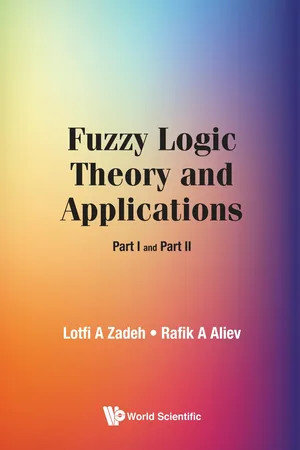
Fuzzy Logic Theory and Applications
Part I and Part II
Lotfi A Zadeh, Rafik A Aliev
- 612 pages
- English
- ePUB (mobile friendly)
- Available on iOS & Android
Fuzzy Logic Theory and Applications
Part I and Part II
Lotfi A Zadeh, Rafik A Aliev
About This Book
Nowadays, voluminous textbooks and monographs in fuzzy logic are devoted only to separate or some combination of separate facets of fuzzy logic. There is a lack of a single book that presents a comprehensive and self-contained theory of fuzzy logic and its applications.
Written by world renowned authors, Lofti Zadeh, also known as the Father of Fuzzy Logic, and Rafik Aliev, who are pioneers in fuzzy logic and fuzzy sets, this unique compendium includes all the principal facets of fuzzy logic such as logical, fuzzy-set-theoretic, epistemic and relational. Theoretical problems are prominently illustrated and illuminated by numerous carefully worked-out and thought-through examples.
This invaluable volume will be a useful reference guide for academics, practitioners, graduates and undergraduates in fuzzy logic and its applications.
Contents:
- Part I: Fuzzy Sets and Fuzzy Logic (L Zadeh, R Aliev):
- Fuzzy Sets
- Fuzzy Logic
- Restriction Concept
- Fuzzy Probabilities
- Fuzzy Functions
- Fuzzy Systems
- Z-Number Theory
- Generalized Theory of Uncertainty
- Part II: Applications and Advanced Topics of Fuzzy Logic (Lotfi A Zadeh, Rafik A Aliev):
- Restriction-Based Semantics (L Zadeh)
- Granular Computing: Principles and Algorithms (W Pedrycz)
- Complex Fuzzy Sets and Complex fuzzy Logic, an Overview of Theory and Applications (Dan E Tamir, Naphtali D Rishe, Abraham Kandel)
- Introduction to Fuzzy Logic Control (H Ying and D Filev)
- Fuzzy Decision Making (R Aliev)
- Selected Interpretability Aspects of Fuzzy Systems for Classification (L Rutkowski)
- Fuzzy Reinforcement Learning (H Berenji)
- ANFIS: Adaptive Neuro-Fuzzy Inference Systems (J-S R Jang, C-T Wu, K-J Zhang)
- Fuzzy Expert Systems (R Aliev)
- Application of Logistic Regression Analysis to Fuzzy Cognitive Maps (V Niskanen)
- Fuzzy Logic in Medicine (Y Hata)
Readership: Researchers, academics, professionals, graduate and undergraduate students in fuzzy logic and its applications.
Frequently asked questions
Information
Part I
Fuzzy Logic Theory
Chapter 1
Fuzzy Sets
1.1.Introduction
1.2.Definitions
Table of contents
- Cover
- Halftitle
- Title
- Copyright
- Dedication
- Contents
- Preface
- About the Authors
- About the Contributors
- Part I Fuzzy Logic Theory
- Part II Applications and Advanced Topics of Fuzzy Logic
- Bibliography
- Index